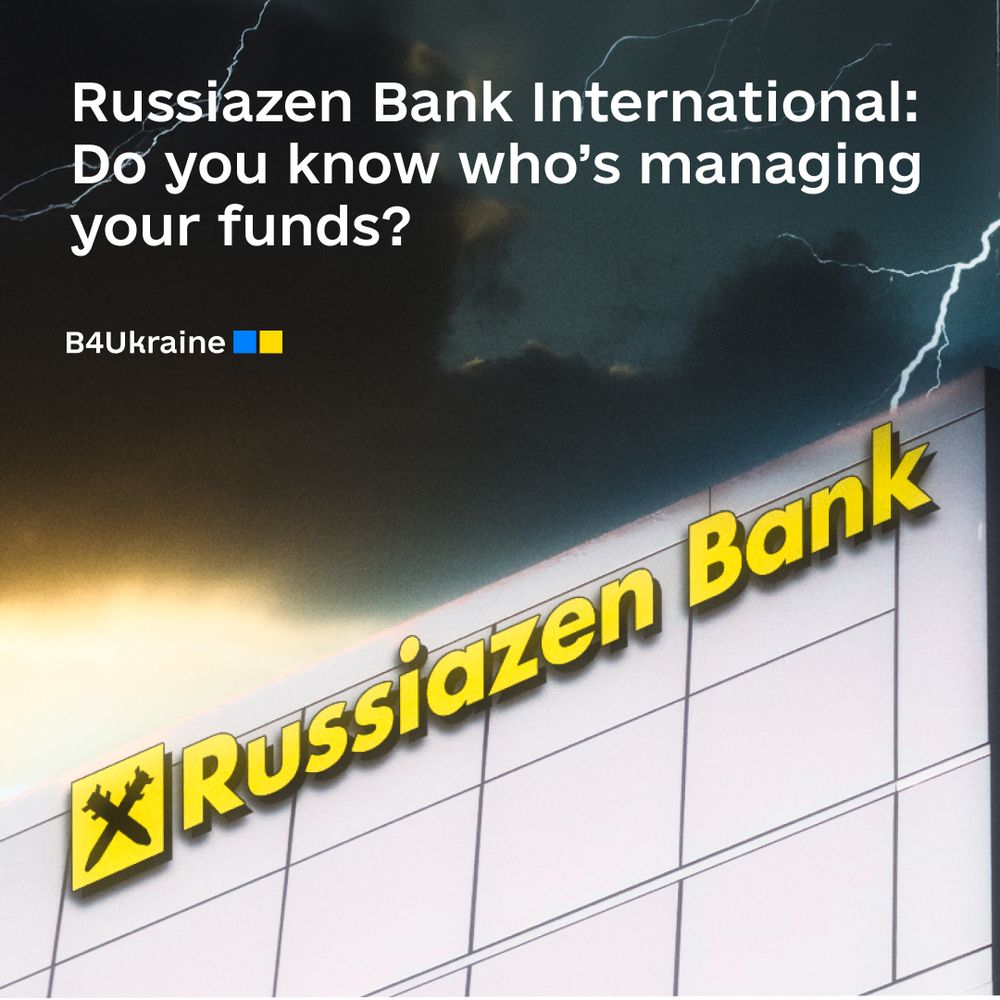
Banking with Raiffeisen constitutes a moral dilemma for ordinary customers and a reputational risk for clients as the bank remains mired in Russia with no clear exit plan
Austria’s embattled Raiffeisen Bank is now under pressure from all quarters to leave Russia. On March 30, Raiffeisen announced a plan to sell or spin off its Russian subsidiary by September 2023, in a move representing a significant change in messaging from the banking group. Yet, as the war continues and casualties mount, the lender now says that a spin-off of its extensive operations in the aggressor state is unlikely, even by the end of 2023. B4Ukraine calls on the Board of Raiffeisen Bank International AG to write off the bank’s Russian assets and, as other lenders have done before them, exit Russia as soon as possible without paying off the Kremlin.
Despite the declared commitment to reduce business activity in Russia, Raiffeisen’s wartime proceeds hardly resemble preparations for a corporate exit. The bank continues to make half of its profits from its Russian business — that’s €2.1 billion in 2023 compared to €2.2 billion in 2022.
Amid this profitability, the Russian division of Raiffeisen increased pay for its employees by €200 million in the first half of 2023, an equivalent of €22,000 payout per employee. With the money Raiffeisen spent on this salary bump, ~5,000 bionic prostheses could have been purchased for the Ukrainian victims of the Russian aggression. But instead, Raiffeisen “continues to sponsor the military aggression of Russia,” said Ukraine’s National Agency on Corruption Prevention (NACP) when it declared the banking group an “international sponsor of war” earlier this year.
According to media reports, Raiffeisen plays a vital role in the Russian economy, offering a payments lifeline and accounting for roughly one quarter of euro transfers to the country and handling up to 50% of all the money flows between Russia and the rest of the world. Raiffeisen has continued its relationship with Kremlin-owned and sanctioned Sberbank, having replaced JP Morgan as custodian for its depositary receipts.
According to Ukraine’s NACP, Raiffeisen is also of great importance to some prominent Russian oligarchs: “Fictitious companies in Cyprus, which are within the sphere of influence of Russian oligarchs close to the Kremlin, Arkady and Boris Rotenberg, have long been serviced by Raiffeisen Bank International.”
In addition, the group maintains significant investments in Russia’s oil and gas industry, indirectly boosting Russia’s ability to finance its war efforts.
The bank has also been sharply criticized by investors and branded “uninvestable” by the media after participating in a Russian scheme to grant loan payment holidays to troops fighting in Ukraine.
In January, the U.S. Treasury Department’s Office of Foreign Assets Control (OFAC) launched an inquiry into Raiffeisen over its business related to Russia. The probe concerned potential breaches of Western sanctions, Reuters reported.
After the official U.S. inquiry, Raiffeisen was faced pressure from the European Central Bank (ECB), requesting the lender to unwind its highly profitable business in Russia.
ECB’s probe inspired by the U.S. government has finally prompted EU state leaders to comment on this matter. Polish Prime Minister Mateusz Morawiecki said he supported the ECB’s attempt to push the Raiffeisen to exit Russia — and called for possible sanctions if it doesn’t.
Responding to the B4Ukraine Coalition inquiry, Raiffeisen said the delay regarding “assessing all strategic options for the future of Raiffeisenbank Russia” is due to “the complexity of the situation, including restrictive measures imposed by the Russian Federation.”
Late last year the Kremlin imposed strict rules on western businesses still operating within its territory, making it impossible for them to sell their subsidiaries without permission and banning the repatriation of profits of certain critical sectors from the country.
This once again confirms that the longer a financial institution stays in the Russian market the higher the risks are. French bank Société Générale took a €3.2bn hit on the sale of its Russian assets in May 2022, but still managed to deliver record underlying performances that year with the CEO Frederic Oudea stating “it was the best decision and we [left Russia] in a very responsible way”.
Raiffeisen should write off the group’s Russian assets, write down the loss, and exit Russia without handing over valuable assets that could be used to prolong its war against Ukraine.
Doing the right thing in the right way will likely come at a cost. Yet, it will pay off in the long term. Drop the keys and leave!
Otherwise, if Raiffeisen continues to delay and help prop up Russia’s military regime, its website might as well look like this: https://www.russiazen.com